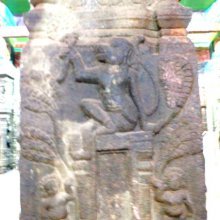Vana, Vaṇa, Vāna, Vāṅa: 35 definitions
Introduction:
Vana means something in Buddhism, Pali, Hinduism, Sanskrit, Jainism, Prakrit, the history of ancient India, Marathi, Hindi, Tamil. If you want to know the exact meaning, history, etymology or English translation of this term then check out the descriptions on this page. Add your comment or reference to a book if you want to contribute to this summary article.
Vana has 35 English definitions available.
Alternative spellings of this word include Vaan.
Images (photo gallery)
(+37 more images available)
Languages of India and abroad
Sanskrit dictionary
[Deutsch Wörterbuch]
Source: Cologne Digital Sanskrit Dictionaries: Böhtlingk and Roth Grosses Petersburger WörterbuchVaṇa (वण):—s. dhigvaṇa .
--- OR ---
Vana (वन):—
--- OR ---
Vana (वन):—2. (von 1. van) n. etwa Verlangen, Sehnsucht in der Stelle: taddha tadvanaṃ nāma tadvanamityupāsitavyam [Kenopaniṣad 31.] [] : tadbrahma ha kila tadvanaṃ nāma tasya vanaṃ tadvanaṃ tasya prāṇijātasya pratyagātmabhūtatvādvananīyaṃ saṃbhajanīyam .
--- OR ---
Vana (वन):—3. indecl. gaṇa cādi zu [Pāṇini’s acht Bücher 1, 4, 57.]
--- OR ---
Vāṇa (वाण):—
--- OR ---
Vāṇa (वाण):—
--- OR ---
Vāna (वान):—1. (von 2. vā) n.
1) das Wehen (gati) [Trikāṇḍaśeṣa 3, 3, 260.] [Hemacandra’s Anekārthasaṃgraha 2, 285.] [Medinīkoṣa Nalopākhyāna 20.] [Vaijayantī] beim Schol. zu [NALOD. 2, 26.] —
2) Geruch, Wohlgeruch [Hemacandra’s Anekārthasaṃgraha] [Vaijayantī] —
3) Fluth [Hemacandra’s Anekārthasaṃgraha]
--- OR ---
Vāna (वान):—2. (partic. von 3. vā)
1) adj. eingetrocknet, trocken; n. getrocknete Frucht [Amarakoṣa 2, 4, 1, 15.] [Trikāṇḍaśeṣa 3, 3, 260.] [Hemacandra’s Abhidhānacintāmaṇi 1130.] [Anekārthasaṃgraha 2, 151. 285.] [Medinīkoṣa Nalopākhyāna 20.] [Halāyudha 2, 34.] [Vaijayantī] beim Schol. zu [NALOD. 2, 26.] ānana ein trockener Mund [NALOD. 2, 26.] —
2) n. = gokṣīrajaṃ tavakṣīram [Rājanirghaṇṭa im Śabdakalpadruma] — Vgl. a 2).
--- OR ---
Vāna (वान):—3. (von 5. vā) n.
1) das Weben [Trikāṇḍaśeṣa 3, 3, 260.] [Hemacandra’s Anekārthasaṃgraha 2, 285.] [Medinīkoṣa Nalopākhyāna 20.] [Sāyaṇa] zu [Ṛgveda 2, 3, 6.] sūcīvānakarmāṇi (sūcīkarman beim [Scholiast] zu [Bhāgavatapurāṇa] [?10,45,36) unter den 64 Künsten Oxforder Handschriften 217,a,8 (ebend. 11 liest der Scholiast zu Bhāgavatapurāṇa] bāṇa st. vāna) . —
2) Geflecht, Matte [Trikāṇḍaśeṣa] [Hemacandra’s Anekārthasaṃgraha] [Medinīkoṣa] — Vgl. tantu .
--- OR ---
Vāna (वान):—4. (von 1. vana) n. ein dichter Wald [NALOD. 3, 6.] [Hemacandra’s Abhidhānacintāmaṇi 91, Scholiast]
--- OR ---
Vāna (वान):—5. n. ein unterirdischer Gang, Mine [Hemacandra’s Anekārthasaṃgraha 2, 285.] Vielleicht bildlich vom Blumenkelch in der Stelle puṣpavānakalasvanāḥ (bhramarāḥ) [Rāmāyaṇa Gorresio 2, 56, 13.]
--- OR ---
Vānā (वाना):—f. Wachtel [Jaṭādhara im Śabdakalpadruma]
Sanskrit, also spelled संस्कृतम् (saṃskṛtam), is an ancient language of India commonly seen as the grandmother of the Indo-European language family (even English!). Closely allied with Prakrit and Pali, Sanskrit is more exhaustive in both grammar and terms and has the most extensive collection of literature in the world, greatly surpassing its sister-languages Greek and Latin.
See also (Relevant definitions)
Starts with (+792): Vana sampage gida, Vana sampige, Vana Samyutta, Vana surna, Vana vaasa, Vana-benda, Vana-gaajaa, Vana-khanu, Vana-kolamantalam, Vana-kopati, Vana-mahapala, Vana-mugali, Vana-sringatamu, Vana-tittam, Vana-turkkatevi, Vana-udyoga, Vana-upakhanda, Vana-vatika-trina-jantu-gocara-paryanta, Vanaamantrana, Vanaardraka.
Ends with (+2254): Abharavana, Abhavabhavana, Abhavana, Abhayavana, Abhibhavana, Abhidevana, Abhidhabhavana, Abhidhavana, Abhidravana, Abhihavana, Abhinavana, Abhinavayauvana, Abhinirvana, Abhisambhavana, Abhisantvana, Abhisevana, Abhishavana, Abhishravana, Abhishtuvana, Abhisyandivana.
Full-text (+2273): Vanas, Vanadanda, Girvana, Vanasuta, Pitrivana, Piyuksha, Vanavasin, Bana, Antarvana, Apavana, Vanara, Amravana, Vanari, Vanaprastha, Vanamakshika, Agrevana, Jetasahvaya, Vanamala, Antarvanam, Girvanas.
Relevant text
Search found 141 books and stories containing Vana, Vaṇa, Vāna, Vāṅa, Vāṇa, Vāṇā, Vānā, Vanā, Vaña; (plurals include: Vanas, Vaṇas, Vānas, Vāṅas, Vāṇas, Vāṇās, Vānās, Vanās, Vañas). You can also click to the full overview containing English textual excerpts. Below are direct links for the most relevant articles:
Rig Veda (translation and commentary) (by H. H. Wilson)
Kena upanishad (Madhva commentary) (by Srisa Chandra Vasu)
Garga Samhita (English) (by Danavir Goswami)
Verse 2.21.20 < [Chapter 21 - The Rāsa-dance Pastime]
Verse 2.21.28 < [Chapter 21 - The Rāsa-dance Pastime]
Verse 2.4.4 < [Chapter 4 - The Liberation of Vatsāsura]
Sahitya-kaumudi by Baladeva Vidyabhushana (by Gaurapada Dāsa)
Text 7.31 < [Chapter 7 - Literary Faults]
Text 7.51 < [Chapter 7 - Literary Faults]
Text 7.143 < [Chapter 7 - Literary Faults]
Amarakoshodghatana of Kshirasvamin (study) (by A. Yamuna Devi)
Flora (1): Habitat < [Chapter 5 - Aspects of Nature]
Critical comments by Bhānuji Dīkṣita on certain derivations of Kṣīrasvāmin < [Chapter 6 - Grammatical Aspects]
Musical instruments (e.g., Stringed, Percussions, Cymbals and Wind-blown) < [Chapter 4 - Cultural Aspects]
Related products
(+9 more products available)











